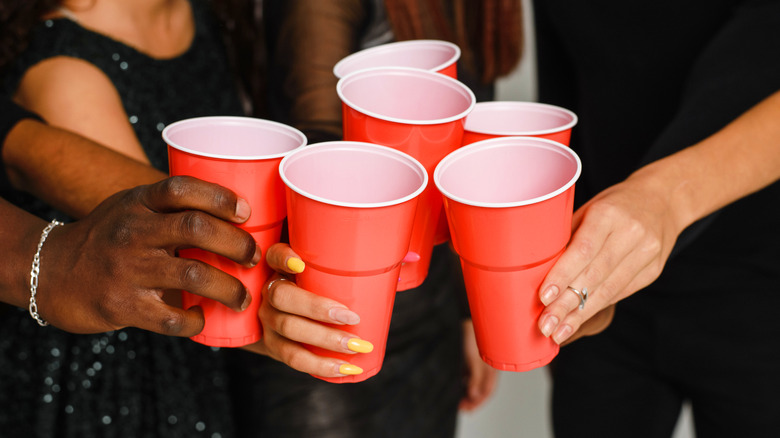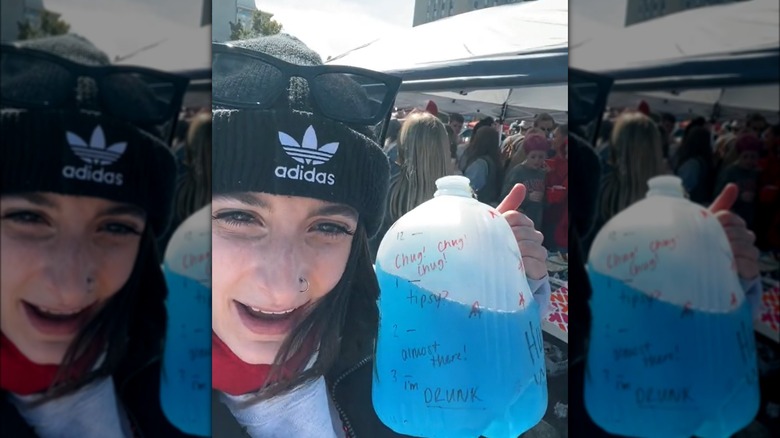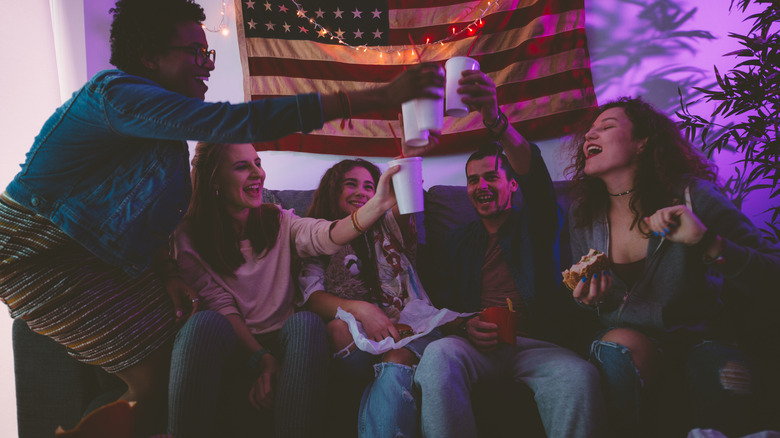How Borgs Took Over The College Drinking Scene
While previous generations of college students frequently scooped cupfuls of Jungle Juice — a brightly-colored, sugary mixed drink usually made by combining sodas, juices, and copious amounts of liquor — out of gigantic, communal containers like plastic storage bins and coolers, it seems Gen Z has decided to fully commit to the BYOB approach instead. But rather than six packs of beer and bottles of alcohol, each partygoer brings their own personal gallon-sized jug of diluted alcohol, also called a borg, short for "Black Out Rage Gallon," according to NBC News. The idea is that borgs keep you hydrated enough to allow you to drink all day or all night long without getting a hangover the next day.
Borgs appeared on the college drinking scene as early as 2020, in the pre-vaccine era of COVID-19 when people started to realize how unsanitary communal punch bowls and Jungle Juice tubs are. By 2021, the jug mixed drinks had become ubiquitous enough to warrant some attention in Rolling Stone. Today they're popular in colleges all across the United States, and like many trends these days, it's thanks in part to their rising popularity on TikTok. The app gave young people a space to share their borg recipes and the clever, pun-filled names — like Justin Bieborg or Our Borg and Savior — they gave their creations. Like Jungle Juice before them, borgs are now a staple at college parties.
Do borgs really prevent hangovers?
A borg might be in a gallon-sized bottle, but only about half of that gallon is made up of alcohol. The rest is actually water mixed with a powdered electrolyte drink mix such as Mio or Liquid IV. This component serves as both a way to flavor the alcohol and to keep the drinker hydrated, at least according to the college students, like TikTok user @justaddbuoy, carrying these giant-sized mixed drinks around on TikTok. But just how effective is it at doing what college students claim?
Staying hydrated is a proven way to reduce the effects of a night of binge drinking, according to Poison Control, however, many borg recipes call for the equivalent of up to 17 standard-sized alcoholic drinks. When consumed with excessive amounts of alcohol like this, even electrolyte-rich water won't prevent a hangover. The National Institute on Alcohol Abuse and Alcoholism explains that a hangover isn't just caused by a lack of hydration. Alcohol also causes irritation in the stomach lining and an overworked liver, and no amount of Mio is going to undo that.
How borgs could affect college drinking trends
Borgs may not be the most effective at preventing hangovers, but there's still a reason the trend is viewed in somewhat of a positive light by experts. In recent years, binge drinking has become a widespread practice among college students, The Substance Abuse and Mental Health Services Administration reports, and borgs have the potential to influence this trend, says Erin Monroe, a substance use prevention specialist based in New York.
The main benefit of borgs, Monroe explained in a TikTok, is that they put the person drinking in control of the contents of the beverages they're drinking. Instead of a mystery menagerie of any available alcohol as is common with Jungle Juice or a communal spiked drink, people can choose to put however much alcohol they want into their borg, and can even participate in the trend without drinking booze at all. Who will know if your borg contains any alcohol at all if you're not sharing?
While of course, it's still possible to overpour the alcohol when making a borg, the fact that your options at a party are limited to the one bottle you bring, usually means you'll be better able to pace yourself throughout the night. You'll probably still get a hangover, but it sure beats drinking out of a shared punch bowl.
If you or anyone you know needs help with addiction issues, help is available. Visit the Substance Abuse and Mental Health Services Administration website or contact SAMHSA's National Helpline at 1-800-662-HELP (4357).


